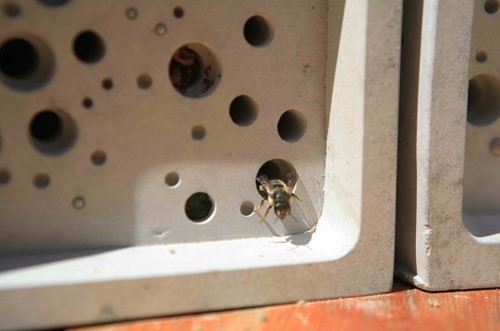A new home for bees, as well as people is on offer from leading developer Lovell as it prepares to give away a free bee nesting block to anyone who reserves a new home at its Oaktree Grange development in Clayton-le-Woods this week.
In support of the Bumblebee Conservation Trust, which runs ‘Bees’ Needs Week’ (8th to 14th July 2019), Lovell is encouraging its customers to do their bit for nature and install a Bee Brick™ in their garden.
The Bee Brick™ provides a nesting site for solitary bees such as the red mason and leafcutter bees. Solitary bees have no queen or honey to protect, meaning they are non-aggressive and don’t sting. Bee houses such as this are a simple way to do something to help our declining bee population, alongside bee friendly planting and other wildlife friendly measures.
Bee Brick™ is solid at the back and has moulded cavities where the bees will lay their eggs, sealing the entrance with mud or chewed up vegetation. Offspring emerge in the spring and begin the process of nesting again, repeating the cycle.
Solitary bees are facing a dramatic decline in numbers due to disease, an increase in chemical use and habitat loss. Pollinators account for one third of the food we eat and are a vital part of our environment to encourage around pets and children.
Gemma Tovey, sustainability co-ordinator for Lovell said, “As a responsible developer we are committed to helping to improve the areas in which we build for the benefit of whole community and this includes the local wildlife too!
“The Bee Brick™ is a really stylish addition to any garden and we hope that this campaign will help raise awareness of plight of these important pollinators and inspire homeowners to consider making their gardens more wildlife friendly."
This is Lovell’s latest initiative to protect the region’s wildlife and follows a recent collaboration with Lancaster Lane Community Primary in Clayton-le-Woods to raise awareness of hedgehog welfare through the creation of a story book titled ‘The Little Lost Hedgehog’. At Oaktree Grange, special holes known as ‘hedgehog highways’ have been installed allowing hedgehogs to move freely between gardens which is vital for their survival.
Earlier this year, the developer also signed up to support the RSPB’s Big Garden Birdwatch which saw its developments and staff across the North West participate in the world’s largest garden wildlife survey, with complimentary RSPB bird boxes gifted to purchasers reserving homes in January.
The Bumblebee Conservation Trust has the following top tips for anyone keen to encourage bees to their garden:
1. Plant more flowers, shrubs and trees: Grow more flowers, shrubs and trees that provide nectar and pollen as food for bees and other pollinators throughout the year. For example, pussy willow, primroses and crocuses in spring, lavenders, meadow cranesbill and ox-eye daisies in summer, ivy and hebes in autumn and mahonia shrubs and cyclamen in winter.
2. Let your garden grow wild: Leave patches of land to grow wild with plants like stinging nettles and dandelions to provide other food sources (such as leaves for caterpillars) and breeding places for butterflies and moths.
3. Cut the grass less often: Cut grass less often and ideally remove the cuttings to allow plants to flower. Native flowering plants in grass areas, field corners, verges and specially sown flower-rich habitats support the greatest diversity of insect pollinators by providing nectar and pollen resources, places to nest or breed and leaves for caterpillars.
4. Don’t disturb insects: Avoid disturbing or destroying nesting or hibernating insects, in places like grass margins, bare soil, hedgerows, trees, dead wood or walls. As well as making sure there are adequate food resources throughout the year for insect pollinators, it is also important to make sure they can nest in safety so that they and the next generation can survive overwinter, to start again in the following spring.
5. Think carefully about using pesticides: Think carefully about whether to use pesticides especially where pollinators are active or nesting or where plants are in flower. Consider control methods appropriate to your situation and only use pesticides if absolutely necessary.
Thoughtfully-designed and family orientated, Oaktree Grange offers a selection of stylish and contemporary 3, 4 and 5 bedroom homes, priced from £214,995. Located in an established residential area of Clayton-le-Woods, Oaktree Grange is its own small haven, yet situated within easy reach of the motorway network and a short walk from Leyland train station.
Oaktree Grange is located in Clayton-Le-Woods, off Dallington Avenue, PR25 5AG. The marketing suite is open 7 days a week, from 10am to 5pm. Call 01772 507 453, or visit https://www.lovell.co.uk/developments/oaktree-grange-clayton-le-woods/
For more information about ‘Bees’ Needs Week’ visit https://www.bumblebeeconservation.org/bees-needs/.
For details of how to buy your own Bee Brick™ visit https://www.greenandblue.co.uk/products/bee-brick.
For information about homes available for sale visit https://www.lovell.co.uk.























